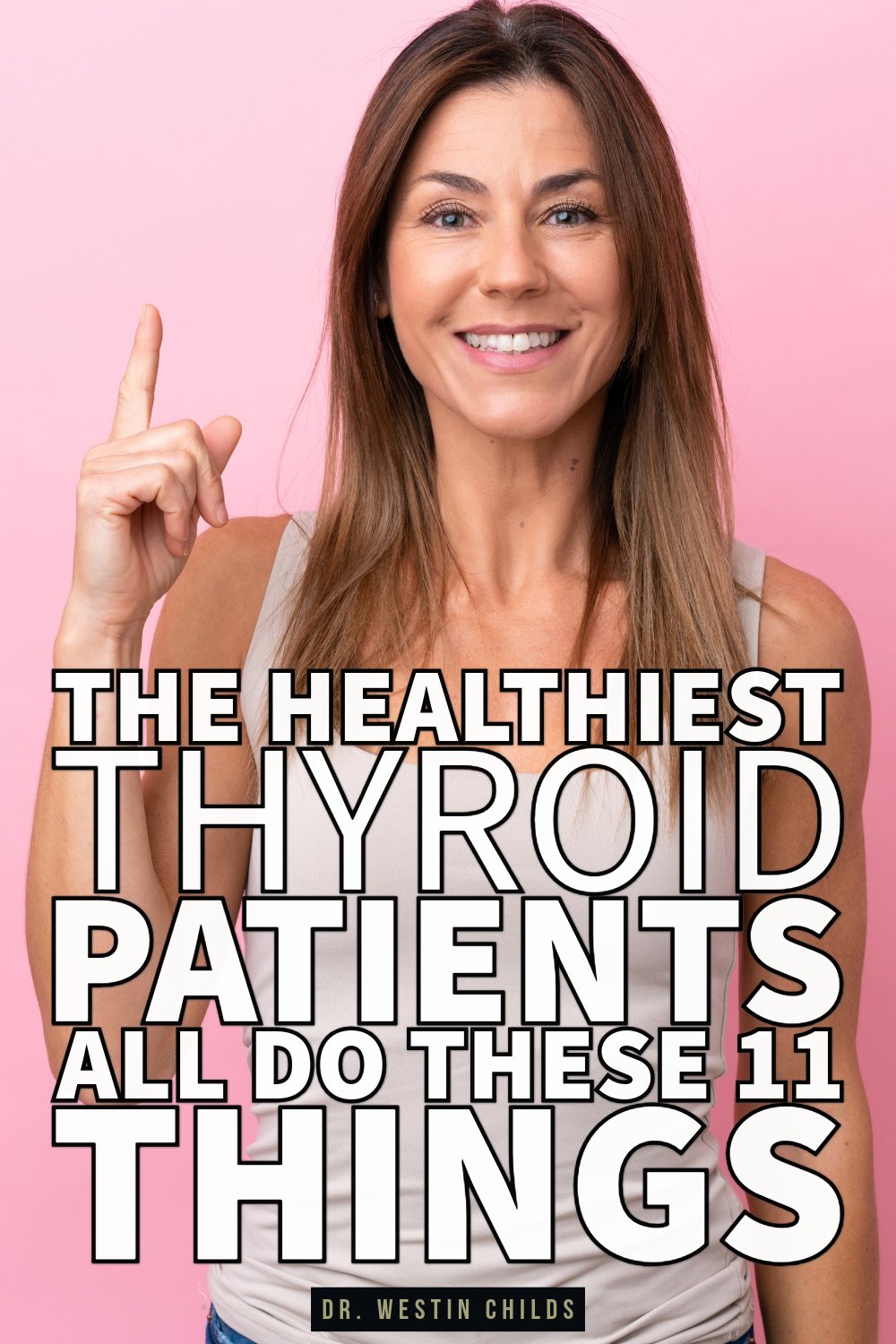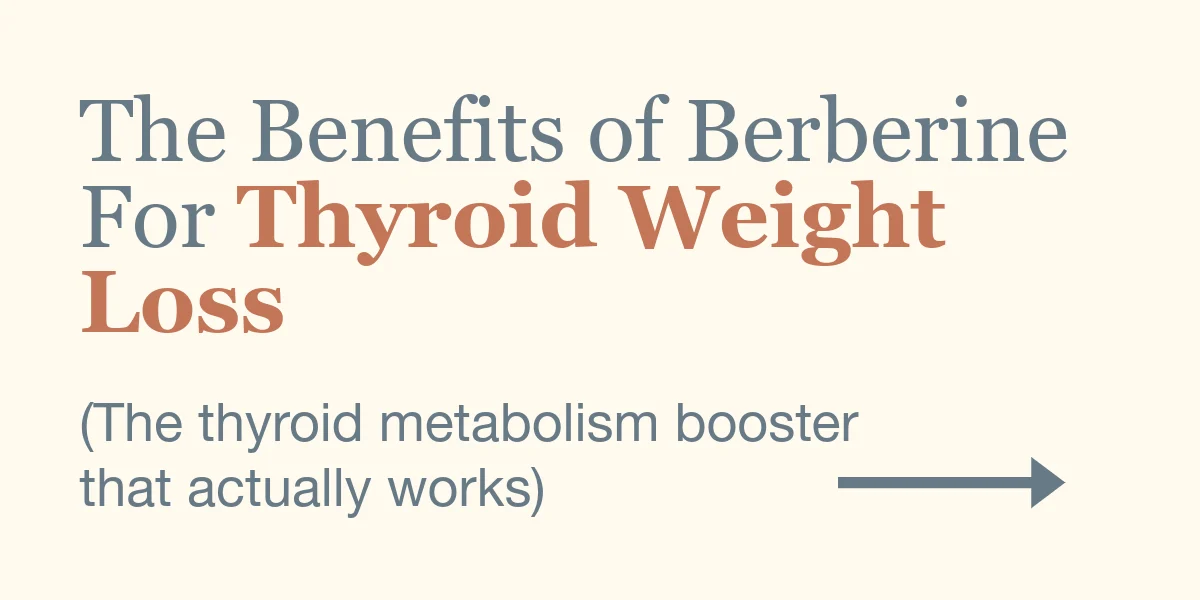As a thyroid patient, it’s easy to get discouraged by thinking you’re going to have to feel the way you do right now for the rest of your life.
But I’m here to tell you that just because you have a so-called chronic thyroid condition, doesn’t mean you can get back to feeling 100%.
Over the last 8 years, I’ve had the advantage of talking to thousands and thousands of thyroid patients.
And throughout this time, I’ve seen many of them improve their situation and end up in a state where you wouldn’t even know they had a thyroid problem if you were looking from the outside.
Unfortunately, I’ve seen far more who never get a handle on their symptoms and who continue to feel terrible for decades.
What’s the difference between these two groups?
Those who are what I call healthy thyroid patients have a few things in common that the unhealthy patients do not:
DOWNLOAD FREE RESOURCES
Foods to Avoid if you Have Thyroid Problems:
I’ve found that these 10 foods cause the most problems for thyroid patients. Learn which foods you should avoid if you have thyroid disease of any type.
The Complete List of Thyroid Lab tests:
The list includes optimal ranges, normal ranges, and the complete list of tests you need to diagnose and manage thyroid disease correctly!
#1. They Eat More Whole Foods Than Processed Foods
Everyone knows that processed foods like fast food and pre-packaged meals are unhealthy (1) but why then do so many people continue to eat them?
When it comes to your thyroid, it’s clear that the processed foods you consume, on average, the worse you will feel.
You’ll probably never be able to completely avoid all processed foods, but that shouldn’t prevent you from limiting your exposure to them.
The healthiest thyroid patients I know all strive to eat more whole foods than processed foods, and I would estimate that this ratio is somewhere around 90% whole foods to 10% processed foods.
#2. They Take A Holistic Approach To Thyroid Management
The sad truth is that Western medicine really only has one option to provide you as a thyroid patient with hypothyroidism or Hashimoto’s:
Thyroid medication (2).
And if you think this is going to solve all of your problems, I have a bridge to sell you.
The allure of taking one capsule and calling it a day may be tempting, but the reality is that you can’t make up for an unhealthy lifestyle by taking a single medication.
The healthiest thyroid patients understand this which is why they take a holistic approach to their thyroid management.
This approach takes into account important factors such as what type of foods they eat, how active they are, how stress manages their thyroid, the impact of sleep on their body, and more.
Whatever you do, don’t get into the mindset of thinking that your thyroid medication is all you need to feel better and that as long as you adjust it to just the right level, you will finally feel like your old self.
#3. They Use Several Types Of Thyroid Hormones
Speaking of thyroid hormones and thyroid medication, you need to be aware that there are more options available than just levothyroxine.
The healthiest thyroid patients that I know are almost always using a combination of thyroid hormones including T4, T3, and T2 while the most unhealthy are generally only using one thyroid hormone, T4.
How do you know which hormones you are taking? All you need to do is look at the name of your thyroid medication.
Levothyroxine, for instance, only contains one thyroid hormone, T4.
Other medications, like Armour Thyroid, contain a combination of T4, T3, and T2.
It should come as no surprise that many thyroid patients prefer medications like Armour Thyroid (3) because they contain hormones that more closely mirror what the healthy thyroid gland would have produced.
But even if you can’t get your doctor to prescribe Armour Thyroid, doesn’t mean you can’t get these other hormones.
You can easily take multiple thyroid medications to meet the needs your body has for T4, T3, and T2.
A simple thyroid hormone stacking regimen may look something like this:
- 100 mcg of levothyroxine (this gets you the T4)
- 10-20 mcg of liothyronine (this gets you the T3)
- And 100 mcg of 3,5 diiodo-l-thyronine (this gets you the T2)
Can you feel awesome only using levothyroxine? Sure, I’ve seen it.
But the odds are not in your favor which is why stacking thyroid hormones is almost always preferred.
#4. They Are Always Experimenting
Some thyroid patients think that once they get their dose of thyroid medication dialed in they are good for life.
But that couldn’t be farther from the truth.
Your body isn’t some static object that responds to the same inputs time after time.

Instead, it’s a dynamic organism that responds differently to inputs depending on the time of the year, what’s happening in your life at any given moment, how much sleep you had the day before, and even your current age.
This means one thing:
Whatever is working for you right now, may not work for you in a few weeks, months, or even years.
This requires that you always pay attention to your health and that you always iterate and experiment which is exactly what the healthiest thyroid patients do.
#5. They Are Always Researching
If you were to ask your doctor, they would probably make it sound like we have the thyroid figured out.
All you need, at least from their perspective, is a single dose of levothyroxine and a TSH test every now and then to adjust your dose as needed.
But, as you might have already guessed, this isn’t the case at all.
Researchers are constantly uncovering new and helpful information relating to the thyroid.
Some of this newer research includes topics like how genetics impacts an individual’s ability to metabolize and use different thyroid hormones (4), the importance of lesser-known thyroid hormones like T2 (5), and the impact carbohydrates have on T3 levels (6).
The healthiest thyroid patients I know are constantly learning, researching, and applying information as it comes so they can always try to get themselves as close to 100% as possible.
#6. They Don’t Rely Solely On Their Doctor
It would be irresponsible for me to suggest that you should ignore whatever your doctor tells you but it would also be equally as irresponsible to suggest that you should blindly believe and follow whatever advice they give to you.
This is for two reasons:
#1. As well-meaning as doctors are, they are never going to be as invested in your health as much as you are.
And #2. Most doctors are perfectly content to provide you with levothyroxine, recheck your TSH periodically, and blame your symptoms on some other factor.
If you don’t believe me, just ask yourself this question:
When was the last time your doctor ever mentioned the importance of something simple like avoiding processed foods in favor of whole foods?
When did he or she last check your vitamin D status?
When have they taken an interest in your activity level or stress?
We all know these things are arguably more important than thyroid medication and, yet, they are almost never brought up or discussed by doctors who treat thyroid patients!
I don’t bring this up to say that doctors are bad people or that they don’t care, just that you shouldn’t expect them to care more about your own health than you do.
And the healthiest thyroid patients I know, out of necessity, have all taken their health into their own hands.
They’ve taken control and they’ve crafted a better life with or without their doctor’s help and you can too.
#7. They Exercise At Least 3 Times Per Week
Forget about thyroid patients for a minute, this is something that every single healthy human on the planet has in common, at least those you’d want to emulate.
Exercise, by itself, isn’t some magical cure for your thyroid, but no one can deny its powerful effects on the entire body, including its effect on the thyroid (7).
And healthy thyroid patients exercise at least three times per week.
By the way, exercise can mean a lot of different things and can range from mild intensity like yoga to high intensity like cycling.
Find what you enjoy, do it regularly, and reap the benefits to your health and thyroid.
#8. They Take Active Steps To Manage Their Stress
I’ve heard it said that if you look around and assume that at least 50% of the people around you are going through a life-altering crisis the only thing wrong with this statement is, if anything, it underrepresents reality.
Put simply:
Stress is an inevitable part of everyone’s life, it just so happens that it hits thyroid patients much harder than the average person due to the impact thyroid function has on cortisol (8).
As a result, any thyroid patient who wishes to get back to feeling 100% must have a plan in place for managing stress when it inevitably comes knocking.
And just like exercise, this doesn’t have to get complex.
You just need to find something that your body responds to and that helps you relax and blow off steam.
For my wife, who happens to have a thyroid problem, that’s a bath with Epsom salt and essential oils.
For me, it’s 20 minutes of FAR IR sauna every night.
#9. They Are A Normal Weight
This one may seem like a “no duh” type of statement, but there’s more here than meets the eye.
You might be tempted to think that the healthiest thyroid patients are healthy BECAUSE they are a normal weight.
But what you’re missing is that being healthy is REQUIRED to maintain a normal weight.
It’s not that these thyroid patients are magically a normal weight, it’s that they spend time and attention on the things that matter and that are required to allow them to stay there.
Just like you, they were in a situation where it was easy to put on weight and hard to lose it.
But after taking care of the things we’ve already talked about like exercise, eating whole foods, avoiding processed foods, and managing their stress, they’ve put their thyroid into a situation where staying lean is simple.
This is something that all thyroid patients can achieve, but it comes at the cost of no small amount of effort.
#10. They Aren’t Afraid Of Healthy Carbohydrates
Speaking of eating whole foods, the healthiest thyroid patients understand two important things about carbohydrates:
#1. They are necessary for proper thyroid function.
And #2. Whole food sources of carbohydrates like fruits and vegetables are not the same thing as processed sugars.
One of the biggest mistakes that thyroid patients make is thinking they need to cut carbohydrates in order to lose weight.
This approach not only negatively impacts thyroid function, it also robs you of the amazing bioactive compounds found in naturally occurring fruits and vegetables.
#11. They Have Meaningful Relationships
As you might have expected, healthy thyroid patients have success in more areas of their lives than just their thyroid health.
These patients understand the importance of having a network of people around them whom they love and trust.
People who they can lean on during their lows, people who cheer them on during their highs, and people who provide valuable insight and counsel when asked.
Having this kind of support system in place means you’re more likely to be happier and be more satisfied with your life (9) which will translate into more energy and effort that you can put into improving your thyroid.
Your Next Steps
I’m not going to say that getting back to feeling 100% is possible for every single thyroid patient who reads this.
That would be an overly optimistic take on the situation.
But I will say, and strongly believe, that every single thyroid patient out there can feel better than they feel right now.
And if you are tired of feeling like the average thyroid patient who, according to survey data (10), experiences fatigue, weakness, muscle aches, decreased libido, weight gain, and depression on a daily basis, then it’s probably time to stop acting like them.
Instead, follow in the footsteps of the healthiest thyroid patients out there because they’ve already pretty much figured this thyroid thing out.
Scientific References
#1. ncbi.nlm.nih.gov/pmc/articles/PMC10561017/
#2. ncbi.nlm.nih.gov/pmc/articles/PMC6619426/
#3. ncbi.nlm.nih.gov/pmc/articles/PMC8090032/
#4. ncbi.nlm.nih.gov/pmc/articles/PMC2515080/
#5. pubmed.ncbi.nlm.nih.gov/26593437/
#6. ncbi.nlm.nih.gov/pmc/articles/PMC9165850/
#7. ncbi.nlm.nih.gov/pmc/articles/PMC9258892/
#8. ncbi.nlm.nih.gov/pmc/articles/PMC10772313/
#9. ncbi.nlm.nih.gov/pmc/articles/PMC3150158/
#10. ncbi.nlm.nih.gov/pmc/articles/PMC6916129/








